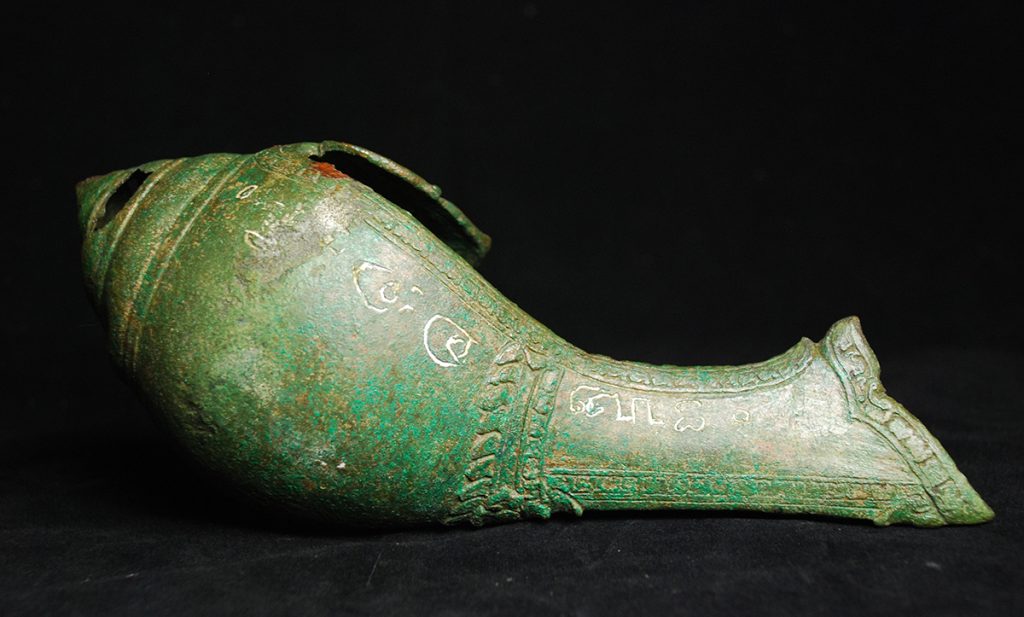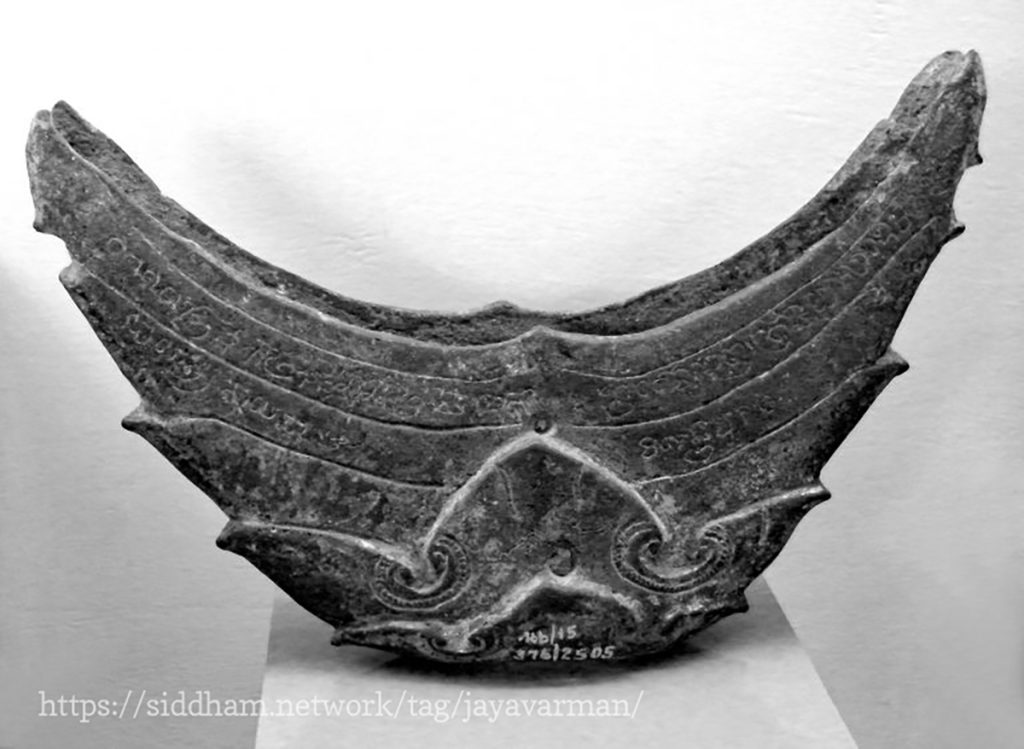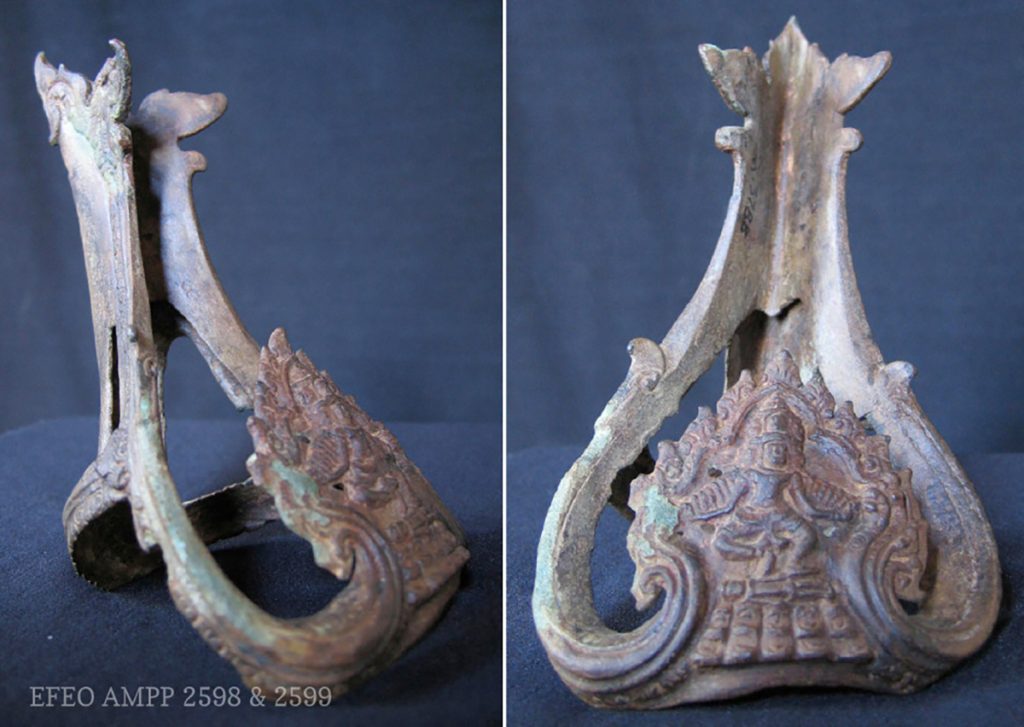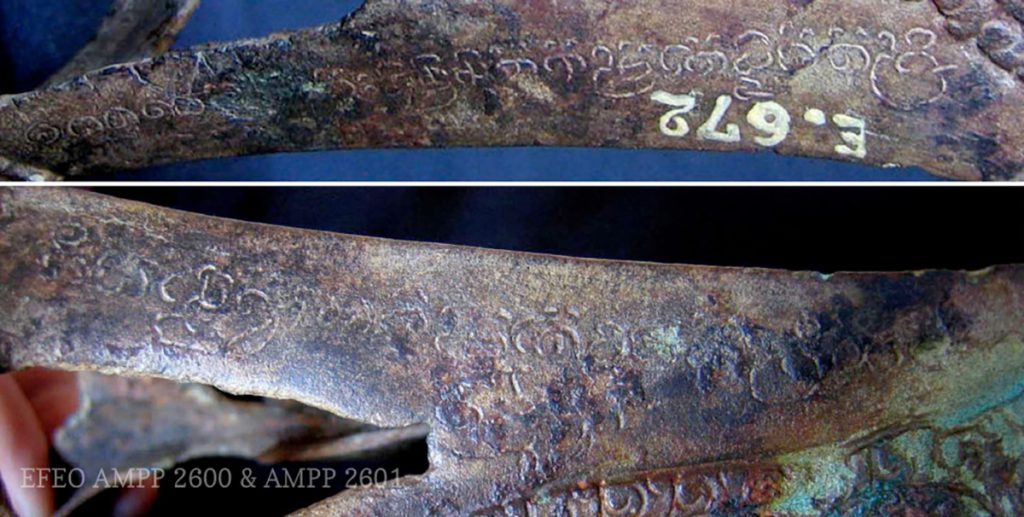៣- ចារឹកទម្ររាងមូល K. ១០៥៦
ចារឹកខ្លីនេះ រកឃើញនៅទីតាំងជាមួយចារឹក K. ១០៥៣ និង K. ១០៥៥ និងរក្សាទុកសារមន្ទីរខេត្តប្រាចីនបុរី ប្រទេសថៃដូចគ្នា។ វត្ថុនេះមានកម្ពស់ ១៩ ស.ម. ទទឹង ១២ ស.ម. និងបរិមាត្រ ៣៦ ស.ម.។ គេសន្និដ្ឋានវត្ថុនេះថាជាជើងទម្រសម្រាប់ដោតទៀន។
ចារឹកខ្លីនេះ ចារពីព្រះរាជជំនូនព្រះបាទជ័យវម៌្មទេវទី៧ ដែលថ្វាយវត្ថុនេះដល់អរោគ្យសាលានៅតំបន់សំវោក ក្នុងមហាសករាជឆ្នាំ១១១៥ ត្រូវនឹងគ្រិស្ដសករាជឆ្នាំ១១៩៣-១១៩៤។
អត្ថបទជាអក្សរខ្មែរទំនើប
១- ១១១៥ឝកវ្រះជំន្វនវ្រះបាទកម្រតេងអញឝ្រិជយវម៌្មទេវតវ្រះអារោគ្យសាលនាសំវោក ○
អត្ថបទសម្រួលជាភាសាខ្មែរទំនើប
មហាសករាជឆ្នាំ១១១៥ ព្រះជំនូនព្រះបាទគម្ដែងអញស្រីជ័យវម៌្មទេវ(ទី៧ ថ្វាយ)ដល់ព្រះអរោគ្យសាលានា(តំបន់)សំវោក។
៤- ចារឹកលើសង្ខសំរិទ្ធ K. ១០៥៤
ចារឹកខ្លីនេះ ក៏រកឃើញនៅទីតាំងជាមួយចារឹក K.១០៥៣ K.១០៥៥ និង និង K.១០៥៦ និងដាក់តាំងបង្ហាញជាមួយគ្នាផងដែរ។ វត្ថុនេះមានកម្ពស់ ៩ ស.ម. ទទឹង ១១ ស.ម. និងកម្រាស់ ២៦ ស.ម.។ វត្ថុមានចារឹកនេះ ជាសង្ខសំរិទ្ធ សម្រាប់ប្រើក្នុងកិច្ចពិធី។ ចារឹកខ្លីនេះបញ្ជាក់ប្រាប់ថា សង្ខនេះជាតង្វាយរបស់ «ព្រះវ្រលោង»។
អត្ថបទជាអក្សរខ្មែរទំនើប
១- ៙ ជំន្វនវ្រះវ្រលោង ○
អត្ថបទសម្រួលជាភាសាខ្មែរទំនើប
តង្វាយរបស់ព្រះវ្រលោង។

៥- ចារឹក K. ៩៧៣
ចារឹកនេះ ចារនៅលើវត្ថុសាងអំពីសំរិទ្ធមានរូបរាងដូចចារឹក K. ១០៥៣ ដែលអ្នកស្រាវជ្រាវសន្និដ្ឋានថាជាជើងទម្រកញ្ចក់។ គេរកឃើញវត្ថុនេះនៅក្នុងឆ្នាំ១៩៥ នៅប្រាសាទគោកងីវ ខេត្តបុរីរម្យ ប្រទេសថៃ។ បច្ចុប្បន្ន វត្ថុនេះរក្សាទុកនៅសារមន្ទីរក្រុងបាងកក។ លោក ហ្សក សឺដែស បានសិក្សាចារឹកនេះចុះផ្សាយនៅក្នុងសៀវភៅសិលាចារឹកនៃប្រទេសកម្ពុជា ក្បាលទី៧ ដោយសន្និដ្ឋានថាជាជើងទម្រកញ្ចក់ ដោយប្រៀបធៀបជាមួយជើងទម្រកញ្ចក់ដែលរកឃើញនៅវត្តភូ។ ចារឹកខ្លីនេះ ពុំខុសពីចារឹក K. ១០៥៣ ប៉ុន្មានឡើយ គឺបង្ហាញថាវត្ថុនេះជាតង្វាយរបស់ព្រះបាទជ័យវម៌្មទេវទី៧ ថ្វាយចំពោះអរោគ្យសាលានៅវិរេន្ទ្របូរ ក្នុងមហាសករាជឆ្នាំ ១១១៤។ អំណានកាលបរិច្ឆេទនេះ ស្នើឡើងដោយលោក ហ្សក សឺដែស ប៉ុន្ដែបើយើងពិនិត្យឡើងវិញលើទម្រង់តួលេខវិញ យើងឃើញថាមានលក្ខណៈជាលេខ ៥ ច្រើនជាងលេខ ៤។ ពោល គឺចារឹកនេះ មានកាលបរិច្ឆេទដូចចារឹក K. ១០៥៣ ដែរ។ បើប្រៀបធៀបទៅលើទម្រង់តួអក្សរចារឹកលើជើងទម្រកញ្ចក់ទាំងពីរនេះ និងចារឹកលើជើងទៀត គឺមានលក្ខណៈស្រដៀងគ្នា ដែលទំនងជាអ្នកចារគឺជាមនុស្សតែម្នាក់។
អត្ថបទជាអក្សរខ្មែរទំនើប
១- ១១១៥ឝកវ្រះជំន្វនវ្រះបាទកម្រតេងអញឝ្រិជយវម៌្មទេវ(ត)
២- អារោគ្យសាលនាវិរេន្ទ្របុរ ○
អត្ថបទសម្រួលជាភាសាខ្មែរទំនើប
មហាសករាជឆ្នាំ១១១៥ ព្រះជំនូនព្រះបាទគម្ដែងអញស្រីជ័យវម៌្មទេវ(ទី៧ ថ្វាយ)ដល់អរោគ្យសាលានាវីរេន្ទ្របូរ។

៦- ចារឹកលើសំរិទ្ធស្រោបសង្ខ K. ៧៧៩
ចារឹកនេះ ចារលើសំរិទ្ធស្រោបសង្ខ(អឌ្ឍសង្ខ) រកឃើញនៅប្រាសាទព្រះខ័ន ខេត្តសៀមរាប ក្នុងឆ្នាំ១៩២៩។ បច្ចុប្បន្នរក្សាទុកនៅសារមន្ទីរជាតិ ភ្នំពេញ។ វត្ថុនេះមានខ្នាត ១៧ x ៨,៥ x ៨ ស.ម. និងមានទម្ងន់ ២៥៨,២ ក្រាម។ ចារឹកនេះសិក្សាដំបូងដោយលោក ហ្សក សឺដែស នៅក្នុងឆ្នាំ១៩៦៤ និងបន្ទាប់មកសើរើសិក្សាឡើងវិញដោយលោក ដូមីនិក ស៊ូទីហ្វ នៅក្នុងឆ្នាំ២០០៩ ដែលបានកែសម្រួលអំណានរបស់លោក ហ្សក សឺដែសឡើងវិញ។
អត្ថបទខ្លីនេះចារបញ្ជាក់ថា សំរិទ្ធស្រោបសង្ខនេះជាព្រះជំនូន(របស់ព្រះបាទជ័យវម៌្មទេវទី៧?) ថ្វាយចំពោះទេពស្រីវីរេន្ទ្រេសូរ នៅឯ(ប្រាសាទ)ស្រីយសោវម៌្មេសូរ ដែលជាក្ដីមួយនៅក្នុងបរិវេណប្រាសាទព្រះខ័ន។
អត្ថបទជាអក្សរខ្មែរទំនើប
១- ៙១១១៨(ឝ)[ក]វ្រះជំន្វន៑តកម្រតេង្ជគតឝ្រិ
២- វីរេន្ទ្រេឝ្វរនាកម្រតេង៑ជគតឝ្រីយឝោវម៌្មឝ្វរ ○
អត្ថបទសម្រួលជាភាសាខ្មែរទំនើប
មហាសករាជ១១១៨ ព្រះជំនូន(ថ្វាយ)ដល់គម្ដែងជគតស្រីវីរេន្ទ្រេសូរនាគម្ដែងជគតស្រីយសោវម៌្មេសូរ៕


—————————
Inscriptions on metal objects in the reign of Jayavarman VII (Part 3)
3- Inscription on round shape supporter K. 1056
This short inscription is found at the site with the inscriptions K. 1053 and K. 1055 and has been conserved at the Prachinburi Provincial Museum in Thailand. This object is 19 cm high, has a width 12 cm, and a perimeter of 36 cm. This object was assumed as a candle holder.
This inscription is from the royal gift of King Jayavarman VII, who dedicated this object to the Arogyasala (ancient hospital) in the Samvok area in 1115 G.E., corresponding to 1193-1194 C.E.
4- Inscription on bronze conch K. 1054
This short inscription is also found at the site with the other inscription as K.1053, K.1055, and K.1056 and displayed together in the museum. This object is 9 cm high, width 11 cm, and a thickness 26 cm. This inscription is a bronze conch used in religious ceremonies. The bronze conch was identified in the inscription as an offering to “Preah Vr Lauṅ”.
5- Inscription K. 973
This inscription is inscribed from a bronze object with a shape similar to the inscription K. 1053, which researchers concluded as a mirror holder. It was discovered in the year 195 at Kork Ngiv Temple, Borei Rom Province, Thailand. It is now conserved in a museum in Bangkok.
Cœdès, G., studied this inscription and published it in the 7th volume of the Inscription of Cambodia, concluding that it was a mirror holder with comparing to the mirror holder found at Wat Phu. This short inscription is not much different from the inscription K. 1053, showing that this object was an offering of King Jayavarman VII to the Ancient Hospital in 1114 G.E. Reading this date was suggested by George Cedes, but if we exam at the number, we see the number 5 rather than 4. Thus, this inscription has the same date as the inscription K. 1053. If we compared the letters of the inscription on both mirror holders, and other parts of the holder are so similar that it is likely that the inscription was inscribed by the same person.
6- Inscription on bronze-coverd conch K. 779
This inscription, inscribed on a bronze-covered conch was found at the Preah Khan temple in Siem Reap in 1929. It has housed in the National Museum in Phnom Penh. This object has dimensions 17 x 8.5 x 8 cm and weighs in at 258.2g. this inscription was first studied by Cœdès in 1964 and then revised by Dominic Sutif in 2009, which revised the text of Cœdès. This short article indicated that this bronze-covered conch was a gift (of King Jayavarman VII?) to the goddess Srirendraso at (temple) Sri Yasovarmanso, a case in the Preah Khan temple complex.
អត្ថបទដើម៖ លោក ហ៊ុន ឈុន តេង






